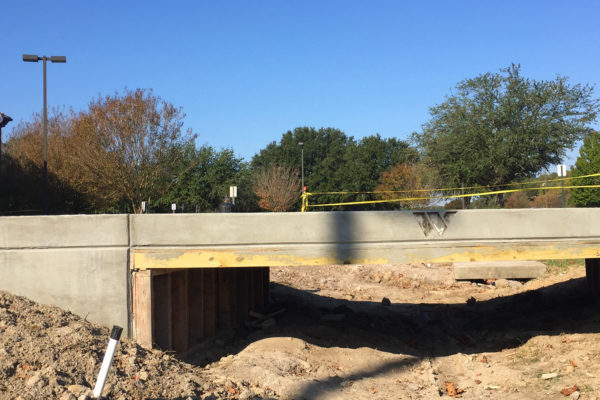Ponding during heavy rains and untreated stormwater runoff will get a fix at Wayne Community College in 2021, thanks to a partnership with Sound Rivers and a $196,700 award from the state’s Environmental Enhancement Grant program.

The grant was announced in late October, and is part of a 2000 agreement between the North Carolina Attorney General’s Office and Smithfield Foods.
Sound Rivers, a conservation organization based in Washington and New Bern and a long-term advocate of clean waterways, was one of 22 grantees awarded a total of nearly $3 million.
“Thanks to this project, students will be able to learn about science and protecting the environment first-hand,” Attorney General Josh Stein wrote in a press release. “At the same time, they – along with future Wayne Community College students – will benefit from improved water quality in the area.”
According to Derek Hunter, WCC vice president of operations, the project is a welcome opportunity for the college to address the health of local streams and rivers, as well as improve aesthetics on a campus with new construction.
“The major benefit seen by the college in this partnership is the opportunity to process our local stormwater runoff for improvement of water quality in our local Neuse River,” Hunter said. “Improving river conditions, while at the same time improving our campus, is a win-win.”
The issue is inadequate draining in some places and untreated stormwater runoff in others – water that runs directly into storm drains and on to the Neuse. One solution will be multiple bio-retention cells.
“There’s three or four places for bio-retention cells, or rain gardens – places that catch a lot of runoff,” said Clay Barber, Sound Rivers’ environmental projects coordinator. “First and foremost, they’re going to filter stormwater that runs off of roof tops and parking lots, and any other impervious surface. They’re kind of like sponges — if you situate them the correct way, they kind of soak up the water, spread it out and let it sink down.”
Barber said Sound Rivers’ funding will provide the construction and training: caretakers knowing the rain gardens’ purpose and maintaining them appropriately is the key to their success.
“This is basically like ‘landscaping with a purpose,’” Barber said. “They’ll be cleaning stormwater, and we’ll be teaching people about it while we do it. We’re doing that because it’s important work to clean water, but we’re also doing it from a sustainable standpoint — in the future, it’s going to be required.”
Barber said WCC was selected from an assessment of between two and 10 project options that were identified for each of 20 different campuses for a simple reason: the administration’s enthusiasm for the projects.
“Wayne Community College recognizes the phenomenal work performed by Sound Rivers and is delighted with the opportunity to partner with them,” Hunter said. “ … The college recognizes there are several opportunities for improvement. The partnership project with Sound Rivers provides the technical resources and funding assistance to identify and implement best practices. This benefits not only our campus but our region by treating the stormwater runoff and reducing the negative impact on local streams and rivers.”
– ◊ ◊ ◊ –
Background
Sound Rivers’ campus stormwater initiative began in 2011 at Edgecombe Community College. The program is designed to work with K-12 schools, community colleges, and local governments to determine stormwater problems, complete site assessments, and develop a plan of recommendations for installation of green stormwater infrastructure as both a retrofit and for future development on public spaces. To date, the initiative has completed 19 campus stormwater assessments and implemented 14 projects across the region. The program fosters relationships with each school or local government staff in order to problem-solve together.
As projects are designed and implemented, Sound Rivers works with partners to identify educational and learning goals and actions. This program provides environmental and water quality benefits through habitat restoration and flood reduction. It also provides societal and educational benefits, including: unique outdoor learning opportunities for diverse student audiences; reduction of flood risk and pollution/public health risks associated with flooded homes (bacteria, toxics, mold).
About Sound Rivers
Sound Rivers is a private nonprofit organization that guards the health and natural beauty of the Neuse and Tar-Pamlico River Basins. We partner with concerned citizens to monitor, protect, restore and preserve the watersheds covering 23% of North Carolina’s land mass. Our goal is to provide clean water to our communities for consumption, recreation, nature preservation and agricultural use.
Founded in 2015 with the merger of two of the state’s oldest grassroots conservation organizations, Sound Rivers combines the deep history of advocacy of the Neuse River Foundation, established in 1980, and the Pamlico-Tar River Foundation, established in 1981. This union to become Sound Rivers creates a powerful advocate protecting our most cherished waterways and bolsters our impact within the State of North Carolina.
Sound Rivers’ three full-time Riverkeepers® monitor and protect the Neuse and Tar-Pamlico River Basins, serving as scientific experts and educational resources to schools and communities in the watershed.
This news release was written by Sound Rivers. For more information about the grant, contact Sound Rivers Communications Director
Vail Stewart Rumley.

